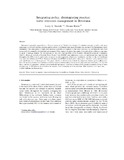Integrating policy, disintegrating practice:water resources management in Botswana

View/
Date
2004Author
Swatuk, L. A.
Rahm, D.
Publisher
Elsevier, http://www.linkinghub.elsevier.com/retrieve/pii/S1474706504001834Type
Published ArticleMetadata
Show full item recordAbstract
Botswana is generally regarded as an African success story. Nearly four decades of unabated economic growth, multi-party
democracy, conservative decision-making and low-levels of corruption have made Botswana the darling of the international donor
community. One consequence of rapid and sustained economic development is that water resources use and demands have risen dramatically in a primarily arid/semi-arid environment. Policy makers recognize that supply is limited and that deliberate steps must be taken to manage demand. To this end, and in line with other members of the Southern African Development Community
(SADC), Botswana devised a National Water Master Plan (NWMP) and undertook a series of institutional and legal reforms
throughout the 1990s so as to make water resources use more equitable, efficient and sustainable. In other words, the stated goal is to work toward Integrated Water Resources Management (IWRM) in both policy and practice. However, policy measures have
had limited impact on de facto practice. This paper reflects our efforts to understand the disjuncture between policy and practice.
The information presented here combines a review of primary and secondary literatures with key informant interviews. It is our view that a number of constraints—cultural, power political, managerial—combine to hinder efforts toward sustainable forms of water
resources use. If IWRM is to be realized in the country, these constraints must be overcome. This, however, is no small task.
